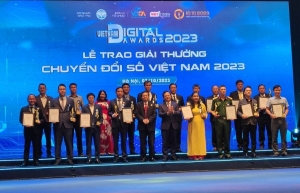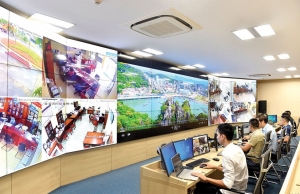Time for Vietnam to grow faster and higher with digital transformation
Such a transformation is rapid development because it creates a digital economy with a growth rate higher than GDP growth by 3-4 times. It is sustainable development because it consumes fewer resources and generates a new resource – data.
 |
| Nguyen Manh Hung, Minister of Information and Communications |
Digital transformation increases the resilience of the economy because the digital environment is distanceless and contactless. It is an inclusive development because anyone, if they have a mobile signal and a smartphone, can access all digital services, and no-one is left behind.
We now enter the fourth official year of carrying out digital transformation. We launched it, we spread awareness, we took action, and now this year we declare it as a new method of development, bringing all people’s activities to the digital environment using Vietnamese platforms.
This year we have been creating new value from data, creating practical results, and using modern and high technology, especially AI, to solve Vietnam’s specific problems.
When an economy develops, it consumes and depletes resources. The digital economy is based on data. This resource is created by humans and is not depleted. So, for the first time in the human history, instead of depleting resources, people create resources for development.
In cyberspace, whoever holds digital platforms holds the data, and makes the decisions. Therefore, if Vietnam’s transformation is not based on domestic platforms, the main beneficiary will not be Vietnam.
The nation’s digital transformation has truly become universal and comprehensive. We have nearly 100,000 community digital tech groups in each locality to guide people in this overhaul.
If we want fast and sustainable transformation, we must walk with both feet. Firstly, quickly popularising the basics through shared digital platforms nationwide; and secondly, moving quickly through experimentation. From something that has been successfully tested and deployed by pioneers and leaders, it rapidly turns into a basic entity that can be popularised.
Leading the way without leading to universalisation does not create change and transformation, and there will be no digital transformation.
This has also been a year of boom for AI applications. The dream of each citizen having some kind of reliable personal assistant is becoming a reality.
With that, the ICT industry is now deploying four important types of virtual assistants. One is a virtual assistant that supports the legislative field, through detecting conflicts and overlaps among legal documents, which are currently too numerous for humans to detect.
The second is supporting law enforcement. This supports civil staff in performing their work according to regulations. They ask questions about their work, and the assistant can find answers from relevant legal regulations. They will be like the knowledge base of civil staff, and working with them is like standing on a knowledge system. Therefore, the quality of civil staff is therefore significantly improved.
Third is a virtual assistant in the judiciary. It is something that can support judges, specifically supporting legal searches such as looking up case laws, related judgments, answering legal situations, and supporting the work of judges. This virtual assistant has been launched and has helped reduce judges’ processing times by up to 30 per cent.
Fourth is a virtual assistant providing legal support to people. This will answer people’s questions related to laws and state regulations, thus improving the intellectual level of the population. This is also a strong way to promote the quality of civil staff.
These are just some examples of what the future may look like. But if the country wants to grow faster and higher, it needs new space, production resources and factors, and motivation. Now, all these factors are ready for Vietnam to take action and to make success in its digital transformation.
 | Wholesale solutions to digital development The digital economy has been playing an increasingly important role, becoming a main driving force to promote sustainable and resilient development. |
 | Vietnam Digital Awards 2023 honours 38 winners As many as 38 winners of Vietnam Digital Awards 2023 were honoured on October 7 ahead of National Digital Transformation Day (October 10). |
 | Unlocking the potential of digital data across Vietnam Vietnam has been developing e-government since 2000. After 20 years, we began to move into the digital transformation phase marked by the National Digital Transformation Programme, building digital government, digital economy, and digital society. |
 | Quang Ninh facing up to digital reality Quang Ninh province is ahead of the curve in exploiting digital opportunities and deploying strong application of IT. |
What the stars mean:
★ Poor ★ ★ Promising ★★★ Good ★★★★ Very good ★★★★★ Exceptional
Related Contents
Latest News
More News
- Financial sector charts next steps as Party Congress convenes (January 21, 2026 | 09:58)
- Three key dynamics supporting Vietnam’s GDP growth in 2026 (January 20, 2026 | 16:34)
- Carlsberg Vietnam and Grab encourage responsible enjoyment and safer mobility (January 16, 2026 | 19:55)
- Redefining Vietnam’s growth model for the era of innovation (January 16, 2026 | 16:40)
- Nghi Son refinery processes first non-Kuwaiti crude cargo (January 16, 2026 | 16:06)
- Siemens and VSIP announce landmark strategic partnership (January 15, 2026 | 14:48)
- VinFast sets record with 175,099 electric vehicles delivered in Vietnam in 2025 (January 15, 2026 | 14:24)
- Year-end shopping season faces rising uncertainty (January 14, 2026 | 18:11)
- State sector sees broad-based profit surge as major groups deliver strong results (January 13, 2026 | 17:34)
- HSBC forecasts Vietnam's GDP growth to hit 6.7 per cent in 2026 (January 13, 2026 | 17:33)

 Tag:
Tag:


















 Mobile Version
Mobile Version